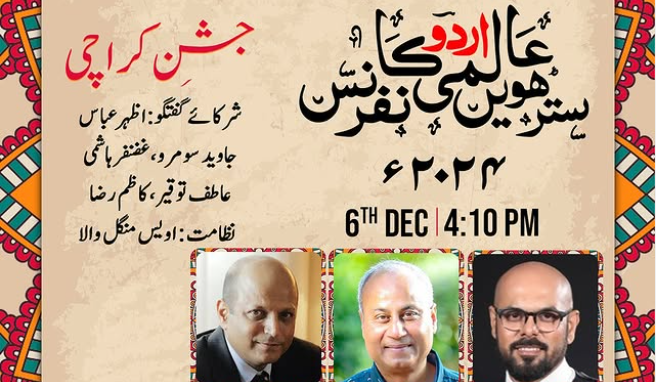The 17th International Urdu Conference 2024, organized by the Arts Council of Pakistan Karachi, is underway. Writers, researchers, and artists from various countries, including Canada, the USA, the UK, France, Japan, and Qatar, are participating. A session titled “Pakistani Media in the Context of International Media” was moderated by Owais Mangalwala. The panel of speakers included renowned journalist and CEO of Geo News Azhar Abbas, Javed Soomro, Ghazanfar Hashmi, Atif Tauqeer, and Kazim Raza.
Speaking at the session, Azhar Abbas said:
“Pakistan’s mainstream media is considered reliable by some and unreliable by others, for various reasons. Despite the proliferation of social media, mainstream media in Pakistan remains popular among the public.
“In Pakistan, TV reaches 170 million people, while YouTube, the largest social media platform, reaches 70 million. Combined, all social media platforms have only half the reach of mainstream media. Most people still trust the news provided by mainstream media because it is verified through multiple sources before reaching the audience. This is why people rely on mainstream media for credible information.”
During the conference, a session titled “Governance for People’s Empowerment” was moderated by Asma Shirazi. The panel of speakers included Salman Farooqi, Shakeel Durrani, Fawad Hassan Fawad, Ghazi Salahuddin, and Asif Haider Shah.
Fawad Hassan Fawad remarked:
“Human beings inherently wish to remain free from rules and regulations. Governance worldwide has been introduced in the name of people’s development. In Pakistan, the biggest issue is the failure to redistribute tax revenues. The public has no connection to the stock exchange; their concerns lie in education and healthcare.”
Ghazi Salahuddin stated:
“If I am here to represent the people, then perhaps I should remain silent. In Pakistan, there is no concept of social justice. In the past, individuals passionate about changing the world would join the civil service.”
Shakeel Durrani, addressing the session, commented:
“Passing the civil service exam is not an achievement in itself. It is only after 30 years in service that one can determine if the person truly deserves congratulations. Our administration and bureaucracy have been failing for a long time.
“Pakistan’s poor governance is causing losses worth billions. In this country, even filing a basic legal case is out of reach for the common man. The judiciary, too, has failed. I have a personal case in Peshawar that has been ongoing for 20 years. People have lost their connection with parliament. The public will only feel empowered when their rights are upheld.”
The former bureaucrat further added:
“No one in Pakistan is accountable to anyone. While laws exist to ensure accountability, they are simply not enforced.”
Asma Shirazi observed:
“India’s development owes a significant part to its free communication environment. If we aim to progress, we need to open up the internet and avoid blocking VPNs. Empowering the public through communication freedom is essential for their empowerment.”


